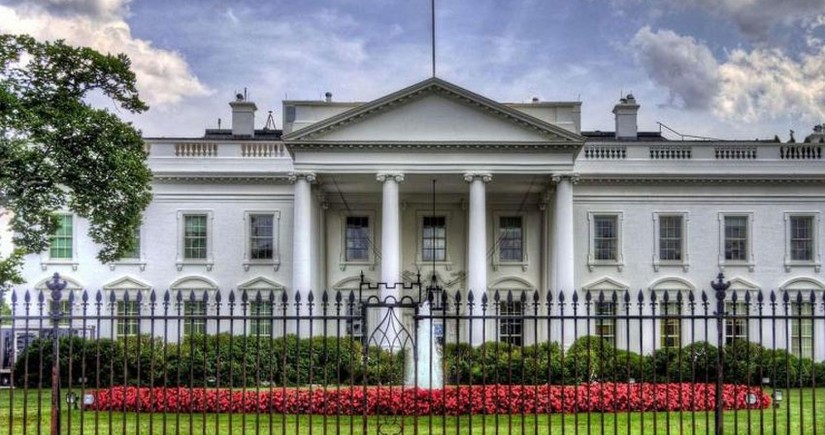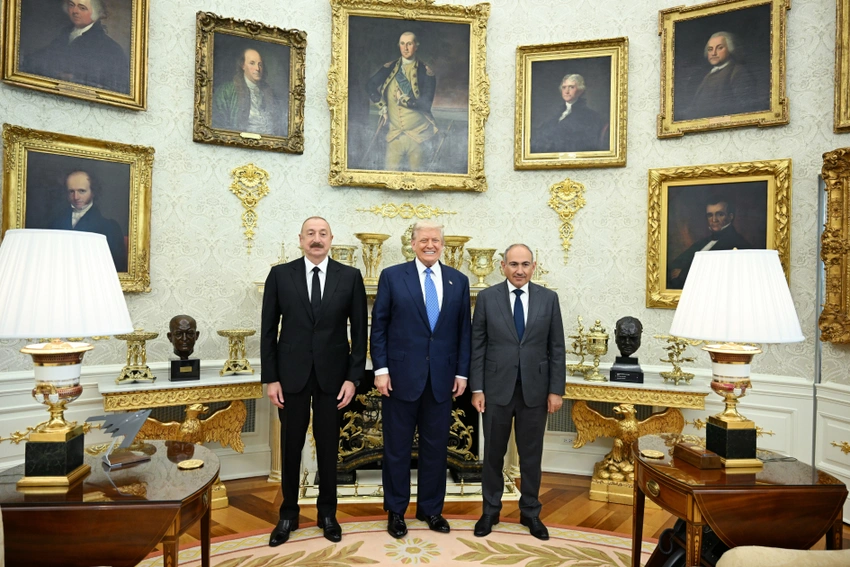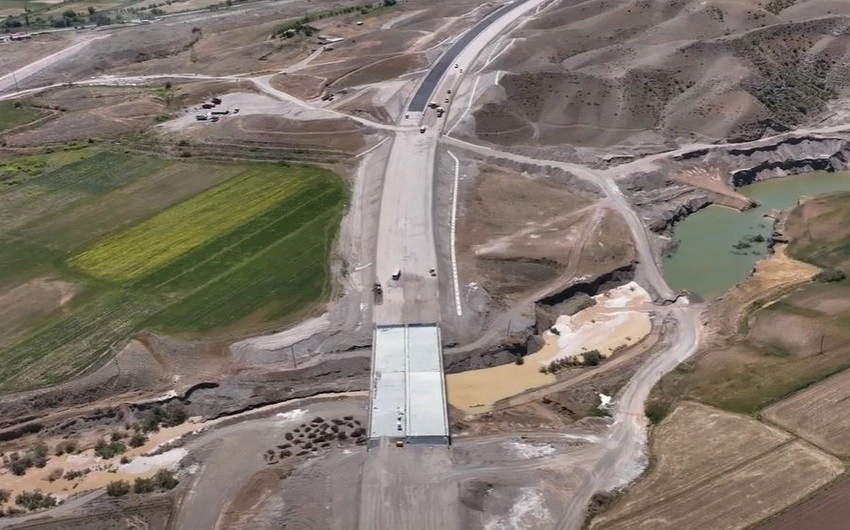"Trump Route" through Zangazur Corridor: Balance of power in South Caucasus changing
- 10 August, 2025
- 14:35

A historic meeting took place in Washington between President of Azerbaijan Ilham Aliyev and Prime Minister of Armenia Nikol Pashinyan with US President Donald Trump.
The summit concluded with the signing of several key agreements concerning peaceful Azerbaijan-Armenian settlement, economic cooperation, and transport integration in the region. The results of the Washington negotiations also open a new political and economic vector that can change the balance of power in the South Caucasus and set a long-term agenda for regional peace and stability.
One of the important points in the Joint Declaration signed by the leaders of Azerbaijan, the US, and Armenia was the confirmation of the need to create opportunities for unhindered movement from the main part of Azerbaijan to Nakhchivan and back. This refers to the Zangazur Corridor that Baku insists on creating. And although in the US it was conditionally called the "Trump Route," the essence of the issue has not changed. This event can rightfully be regarded as a new stage in the development of the South Caucasus and a signal of the beginning of more active international participation in the fate of the region.
Zangazur Corridor: a new geopolitical move
The Zangazur Corridor is not just an important transport artery, but a key step towards a new geopolitical reality. It strengthens Azerbaijan's position in the region, opening new opportunities for expanding economic, cultural, and defense cooperation with key allies in the region and beyond. This project reduces Azerbaijan's dependence on old logistics routes and serves as an important confirmation of its determination to protect its independence and territorial integrity.
For Armenia, the opening of the corridor is a step towards expanding opportunities for diversifying foreign policy and revising its approaches to security. The project requires Yerevan to adopt a new attitude towards its alliances, creating space for flexibility in international politics and strengthening stability in the region based on broader cooperation.
The Zangazur Corridor, therefore, becomes a symbol of new opportunities for all participants and an important element in shaping the new geopolitical landscape of the South Caucasus.
Waiver of Section 907: a step towards strategic partnership
The waiver of Section 907, which limited military and economic ties between the US and Azerbaijan, was an important step in deepening bilateral partnership. This amendment, which had been in effect for three decades, restrained the development of comprehensive cooperation between Baku and Washington, creating artificial barriers between the two countries. Its waiver is not only a legal act but also a powerful signal about the US readiness to significantly expand its influence in the region, where Azerbaijan is a strategic partner.
This step is significant for the entire South Caucasus, as it confirms the reorientation of the region towards more multilateral alliances. For Azerbaijan, this opens new opportunities in security, economy, and technology, which reduces the country's vulnerability to external threats and strengthens its position as a key player in the Caucasus. The waiver of the amendment also confirms that the US intends to become a guarantor in ensuring regional stability, which, in turn, strengthens Azerbaijan's position in the international arena and contributes to its economic growth at a faster pace.

Liquidation of the OSCE Minsk Group: Changing the Diplomatic Landscape
The call for the liquidation of the OSCE Minsk Group has become an important moment in the diplomatic process of the South Caucasus. This group, which existed for more than thirty years, could not in any way contribute to the settlement of the Karabakh conflict, delaying its resolution and strengthening the status quo. In his speech at the III Shusha Global Media Forum in Khankandi in July 2025, President of Azerbaijan Ilham Aliyev noted that a peace treaty could be signed immediately after amendments to the Constitution of Armenia and the dissolution of the OSCE Minsk Group.
One of these conditions has already been fulfilled in Washington, and judging by the development of events, it can be safely assumed that the second condition of President Ilham Aliyev - specifically the homework for Yerevan - regarding amendments to the Constitution of Armenia, will also be fulfilled in the near future.
The liquidation of the Minsk Group symbolizes the end of the old diplomatic model and the transition to new formats of peaceful settlement, where more flexible and operational approaches will play a leading role.
Geopolitics and Balance of Power
In traditional geopolitics, based on concepts of strategic centers and peripheral regions, the South Caucasus has always been an important element for Russia as a Eurasian power. Russia's geographical proximity to the region ensured its dominance in security and diplomacy. However, with the development of new forms of influence, such as diplomatic alliances and economic interactions, traditional geopolitical models are beginning to adapt. The opening of the Zangazur Corridor is a clear confirmation of these changes. It not only reduces Azerbaijan's dependence on previous routes but also significantly expands the country's transit capabilities, strengthening economic ties and diversifying foreign policy directions.
This step demonstrates that modern geopolitics is not so much a struggle for control over territories as the ability to build mutually beneficial partnerships and use the strategic position of the state. As already noted, Russia has long been the leading power in the South Caucasus.
However, the situation is now changing. The strengthening of players such as the United States and changes in geopolitics are leading to a gradual shift in the balance of power in this region. When one state becomes stronger, another that loses influence will try to regain its positions and strengthen its role, and this is a natural reaction. In the context of the South Caucasus, when the United States becomes an active actor in the processes taking place in the region, while Russia, rapidly losing its former influence in the region, will likely try to regain its positions, including through attempts to intercept the mediating role from the United States at the final stage of signing a peace treaty.
However, the big question is whether Moscow will be able to regain this role, especially given the deterioration of relations with Azerbaijan against the background of the incident with the AZAL aircraft shot down in Russian airspace and a number of other bilateral tensions. The lack of clear explanations and apologies from Moscow, as well as Azerbaijan's intention to file a lawsuit in an international court, seriously complicate the prospects for restoring former trust. An additional factor of tension was the facts of oppression of the Azerbaijani diaspora in the Russian Federation, which caused a wide public resonance in Azerbaijan. All this creates additional difficulties for Moscow in maintaining moderation in the region.
Conclusion: A New Geopolitical Alignment in the South Caucasus

Thus, the processes taking place today in the South Caucasus open a new chapter in the history of the region, where old geopolitical models are adapting to modern challenges. The opening of the Zangazur Corridor, the repeal of the 907th amendment, the intensification of US involvement in peace negotiations, and the dissolution of the OSCE Minsk Group—all these events reflect significant changes in the balance of power and influence regional dynamics.
Special mention should be made of the contribution of Azerbaijan's President Ilham Aliyev, whose consistent diplomatic line and ability to leverage the international situation have given these initiatives strategic importance. His active position on the international arena has transformed each of these events into a real step toward strengthening Azerbaijan's authority and influence in the region. By strengthening its interaction with Western countries and forming new economic alliances, Azerbaijan is reinforcing its role as a key player in the changing geopolitical landscape.
Russia, in turn, faces the need to adapt to new conditions, as its traditional role in the region is gradually losing relevance. In these circumstances, Moscow will have to seek new approaches and opportunities for cooperation with countries in the region. And it is not certain that it will be able to do so, especially given its conservative view of the region and lack of desire to accept new realities.
These changes in the South Caucasus are part of broader trends, where geopolitics becomes flexible, and interaction between countries depends on diplomacy, new economic alliances, and constructive cooperation. It is important that these changes contribute to stability in the region and ensure more balanced and mutually beneficial relations among all its participants.
Svetlana Mustafaeva
